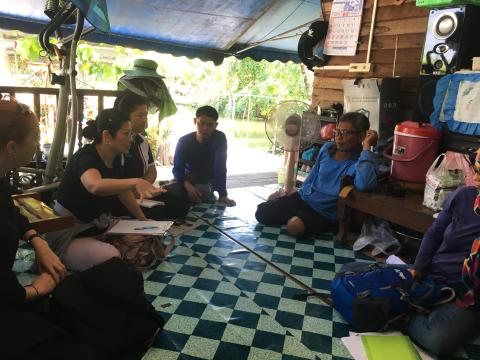Aaron McNevin, Worldwide Fund for Nature, on why we shouldn’t let perfection get in the way of progress when it comes to seafood supply chains
Transformational change for ocean environments and communities will come from small but vital steps, says Dr. Aaron McNevin, Vice President and global lead on aquaculture for WWF and environmental lead with the Seafood Task Force. He shares his insights on the progress and challenges to secure traceability oversight in the seafood supply industry.
I’ve worked with the Seafood Task Force for many years now, helping them to develop and test their actions to secure environmental and social governance improvements and to hold them to account where progress is slow and they should do better.
It’s a major part of WWF’s work globally to drive long-term, transformational change by actively engaging supply chains to source products sustainably.
For the seafood supply industry, operating as they do across vast oceans and in many different countries with different jurisdictions, it is naturally a significant challenge. Rogue vessels and criminal networks can operate undetected and companies, producers and processors across the supply chain differ in language, culture, size, technical capacity and regulation.

Vessel-to-plate traceability solutions must be accessible if we want to encourage widespread adoption. And we need to drive continual, incremental improvements from the ground-up. There is no such thing as ‘degrees of compliance,’ of course, but in an industry which has never been asked to organize their supply chains to meet environmental and human rights objectives, the route to compliance demands work on the ground.
That is where the STF is making a real difference and where major retailers and brands are working together — with the support of NGOs and charities like us — on the vessels, in the farms, in the feed mills and the processing plants to take vital and measurable steps towards traceability oversight.
STF’s pragmatic philosophy is that it is never going to create the perfect farm or the perfect vessel, but that it can empower and support suppliers to work from a baseline up. In other words, don’t let the pursuit of perfection get in the way of progress, but keep making progress. The STF’s Social Code of Conduct provides not only a strategic route to those crucial, incremental steps but also practical solutions to implement them.
Certification alone is not the answer as they recognize — it is impossible to test everyone in the supply chain, but it is possible to sample at scale and achieve representative and powerful results, which can inform and direct social and environmental improvements.
When oceans thrive, the planet regains its natural strength and flourishes. What’s good for the environment is also good for business, of course. Overfishing and habitat destruction result in a huge decline in fish populations, and therefore productivity, whereas stable fisheries can create more stable supplies and pricing.
And those companies that are driving practical changes on the ground can demonstrate to investors, consumers and regulators that their products are ethically and sustainably sourced. Without that evidence, they face increasing reputational, market and regulatory risks in both aquaculture and wild capture.
Many companies are making good progress. We should celebrate it and highlight it whenever possible. But, of course, gaps and challenges remain. Wouldn’t it be great if they could share that progress and discuss how to overcome those gaps and challenges as part of a supply chain-wide debate without fear of legal ramifications?
Could regulators consider a data amnesty for the industry to allow a ‘safe space’ for open and honest discussion about the issues they face? Perhaps we should ask them.
Dr Aaron McNevin is Vice President and Global Network Lead, Aquaculture, for WWF-US and environmental lead for the Seafood Task Force. He has worked with WWF since 2005, developing environmental and social standards for responsible aquaculture.
Worldwide Fund for Nature (WWF) works with more than 100 partnerships across the globe, including some of the world’s largest traders, processors, retailers, hoteliers, restaurants and food service companies.
The views in this article are those of the author and do not necessarily represent the views of the STF.